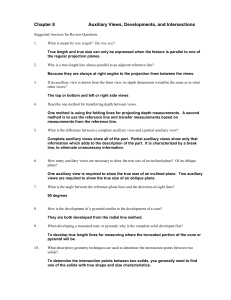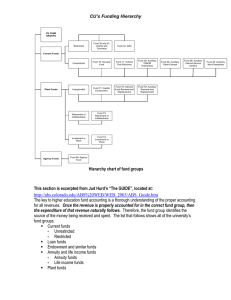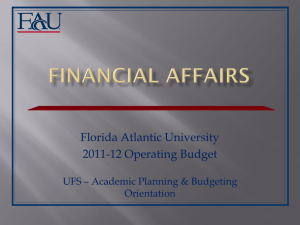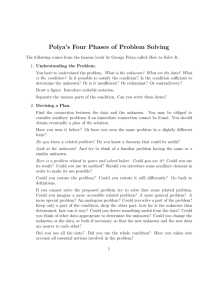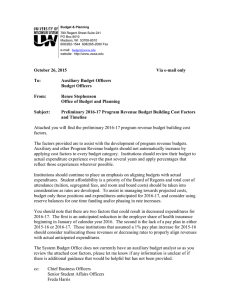CAMPUS POLICY
advertisement
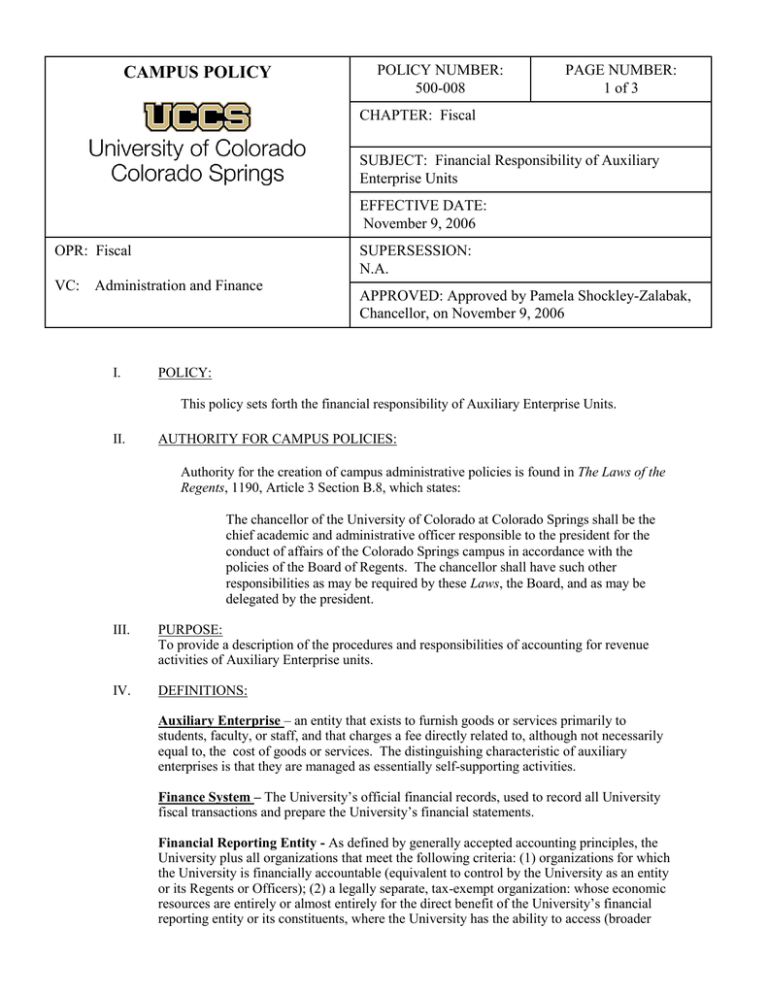
CAMPUS POLICY Now is the tie for all good men to POLICY NUMBER: 500-008 PAGE NUMBER: 1 of 3 CHAPTER: Fiscal SUBJECT: Financial Responsibility of Auxiliary Enterprise Units EFFECTIVE DATE: November 9, 2006 OPR: Fiscal VC: SUPERSESSION: N.A. Administration and Finance I. APPROVED: Approved by Pamela Shockley-Zalabak, Chancellor, on November 9, 2006 POLICY: This policy sets forth the financial responsibility of Auxiliary Enterprise Units. II. AUTHORITY FOR CAMPUS POLICIES: Authority for the creation of campus administrative policies is found in The Laws of the Regents, 1190, Article 3 Section B.8, which states: The chancellor of the University of Colorado at Colorado Springs shall be the chief academic and administrative officer responsible to the president for the conduct of affairs of the Colorado Springs campus in accordance with the policies of the Board of Regents. The chancellor shall have such other responsibilities as may be required by these Laws, the Board, and as may be delegated by the president. III. PURPOSE: To provide a description of the procedures and responsibilities of accounting for revenue activities of Auxiliary Enterprise units. IV. DEFINITIONS: Auxiliary Enterprise – an entity that exists to furnish goods or services primarily to students, faculty, or staff, and that charges a fee directly related to, although not necessarily equal to, the cost of goods or services. The distinguishing characteristic of auxiliary enterprises is that they are managed as essentially self-supporting activities. Finance System – The University’s official financial records, used to record all University fiscal transactions and prepare the University’s financial statements. Financial Reporting Entity - As defined by generally accepted accounting principles, the University plus all organizations that meet the following criteria: (1) organizations for which the University is financially accountable (equivalent to control by the University as an entity or its Regents or Officers); (2) a legally separate, tax-exempt organization: whose economic resources are entirely or almost entirely for the direct benefit of the University’s financial reporting entity or its constituents, where the University has the ability to access (broader CHAPTER: 500 – Fiscal SUBJECT: Financial Responsibility of Auxiliary Enterprise Units POLICY: 500-008 EFFECTIVE: 11/9/06 PAGE: Page 2 of 3 than control and is demonstrated by the ability not the occurrence in a given year) a majority of its economic resources, and such economic resources are Material to the University; (3) organizations for which the nature and significance is such that exclusion would be misleading to the University’s financial statements; or (4) organizations closely related to or financially integrated with the University as exhibited through policies, practices or organizational documents of either entity. Financial Report Review Process – As required by the Administrative Policy Statement Fiscal Roles and Responsibilities, policies and procedures that result in the routine review of financial information to ensure its proper capture in the University’s Finance System. Procedures may include the detailed review of fiscal transactions, periodic budget to actual analysis of financial activity, or prior year to current year analysis of financial activity. Procedures always include taking appropriate investigative and remedial action. Functional Area of Responsibility – A group of related business objectives, processes and entities for which an Officer has oversight by virtue of her/his position, includes multiple Organizational Units and the following characteristics: o o Organizational permanency; and Programmatic autonomy. Internal Controls - A comprehensive strategy for achieving: protection of assets; adequate authorization and record keeping procedures; operational effectiveness and efficiency; proper segregation of duties; reliability of financial reporting; and compliance with applicable policies, laws, regulations, and rules, as well as contracts, grants and donor restrictions. Unrelated Business Income – Income produced by the University from activities beyond our mission and subject to taxation under Internal Revenue Service University Funds – All funds appropriated, generated, awarded, donated or otherwise received by the University regardless of their source. With the exception of University Physicians Incorporated (UPI) funds, the term University Funds does not include Agency Funds (Fund 80) that the University maintains for legally separate External Student Organizations or other entities. V. PROCEDURES: No new Auxiliary Enterprise units will be created nor will any be deleted without approval of the President and the Board of Regents. Annually, each Auxiliary Enterprise unit shall be reviewed to ensure that each continues to provide beneficial service to the University. RESPONSIBILITY: The primary responsibility for managing and operating each unit shall be with the director of each Auxiliary Enterprise unit. Each director shall develop budgets and operating plans, and monitor the financial status of the entity under a schedule developed by the Division of Resource Management. Monitoring includes making necessary adjustments to budgets or plans if there are differences from original projections and correcting entry errors on actual transactions. These financial oriented functions shall be periodically reviewed and approved by the Dean or Director in the organization structure applicable to the entity. CHAPTER: 500 – Fiscal SUBJECT: Financial Responsibility of Auxiliary Enterprise Units POLICY: 500-008 EFFECTIVE: 11/9/06 PAGE: Page 3 of 3 Each Auxiliary Enterprise Unit shall develop formal documented procedures outlining their operating philosophy and pricing criteria. The procedures must include the processes for evaluation costs and determining prices, fees, charges, etc. Auxiliary Enterprise Units shall develop budgets, operating plans, and prices to include the funding of reserves for renewals and replacements, required debt service, planned capital improvements, and general operating contingency reserves. The amount of each reserve shall be determined by the nature of the reserve. Renewal and Replacements – should be based upon depreciation schedules for fixed assets used in the operations of the unit. Required Debt Service – determined by debt instrument. Planned Capital Improvements – should be based upon approved plans and should be identified by specific project. General Operating Contingency – the amount of reserve should be funded on a case by case basis upon thorough review of the rationale, justification, and best judgment of the director. Auxiliary Enterprises Units shall develop annual operating budgets that set formal financial goals for each unit. Budgets shall follow overall University budget policy and shall include the total financial operation of the unit. The University shall maintain a centralized financial system which provides an accrual basis accounting system for all Auxiliaries. Auxiliaries are required to process all financial transactions through the centralized system on an accrual basis and to prepare uniform statements and reports. The Division of Resource Management shall provide assistance to Auxiliary Enterprise Units in the establishment of effective and efficient financial procedures within the units which comply with policies and procedures. VII. HISTORY: None VIII. ATTACHMENTS: None

